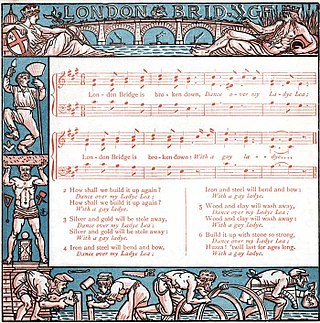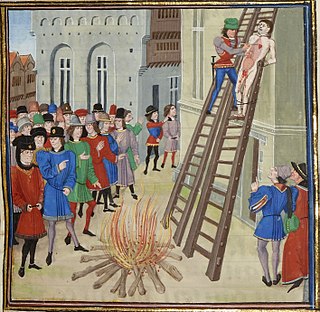
Margaret Hilda Thatcher, Baroness Thatcher, was a British stateswoman and Conservative politician who served as Prime Minister of the United Kingdom from 1979 to 1990 and Leader of the Conservative Party from 1975 to 1990. She was the longest-serving British prime minister of the 20th century and the first woman to hold the position. As prime minister, she implemented economic policies known as Thatcherism. A Soviet journalist dubbed her the "Iron Lady", a nickname that became associated with her uncompromising politics and leadership style.

Soho is an area of the City of Westminster in the West End of London. Originally a fashionable district for the aristocracy, it has been one of the main entertainment districts in the capital since the 19th century.

Southwark is a district of Central London situated on the south bank of the River Thames, forming the north-western part of the wider modern London Borough of Southwark. The district, which is the oldest part of South London, developed due to its position at the southern end of the early versions of London Bridge, for centuries the only dry crossing on the river. Around 43 AD, engineers of the Roman Empire found the geographic features of the south bank here suitable for the placement and construction of the first bridge.

In the arts and literature, the term avant-garde identifies an experimental genre or work of art, and the artist who created it, which usually is aesthetically innovative, whilst initially being ideologically unacceptable to the artistic establishment of the time. The military metaphor of an advance guard identifies the artists and writers whose innovations in style, form, and subject-matter challenge the artistic and aesthetic validity of the established forms of art and the literary traditions of their time; thus, the artists who created the anti-novel and Surrealism were ahead of their times.
Camp is an aesthetic and sensibility that regards something as appealing or amusing because of its heightened level of artifice, affectation and exaggeration, especially when there is also a playful or ironic element. Camp is historically associated with LGBTQ+ culture and especially gay men. Camp aesthetics disrupt modernist understandings of high art by inverting traditional aesthetic judgements of beauty, value, and taste, and inviting a different kind of aesthetic engagement.

Doo-wop is a subgenre of rhythm and blues music that originated in African-American communities during the 1940s, mainly in the large cities of the United States, including New York, Philadelphia, Pittsburgh, Chicago, Baltimore, Newark, Detroit, Washington, D.C., and Los Angeles. It features vocal group harmony that carries an engaging melodic line to a simple beat with little or no instrumentation. Lyrics are simple, usually about love, sung by a lead vocal over background vocals, and often featuring, in the bridge, a melodramatically heartfelt recitative addressed to the beloved. Harmonic singing of nonsense syllables is a common characteristic of these songs. Gaining popularity in the 1950s, doo-wop was "artistically and commercially viable" until the early 1960s and continued to influence performers in other genres.

Latin dance is a general label, and a term in partner dance competition jargon. It refers to types of ballroom dance and folk dance that mainly originated in Latin America, though a few styles originated elsewhere.

John Julius Cooper, 2nd Viscount Norwich,, known as John Julius Norwich, was an English popular historian, travel writer, and television personality.

"London Bridge Is Falling Down" is a traditional English nursery rhyme and singing game, which is found in different versions all over the world. It deals with the dilapidation of London Bridge and attempts, realistic or fanciful, to repair it. It may date back to bridge-related rhymes and games of the Late Middle Ages, but the earliest records of the rhyme in English are from the 17th century. The lyrics were first printed in close to their modern form in the mid-18th century and became popular, particularly in Britain and the United States, during the 19th century.
Roman Holliday were a British band active in the 1980s. They are best known in the UK for their hit single "Don't Try to Stop It", which reached number 14 on the UK Singles Chart in the summer of 1983. A follow-up, "Motormania", peaked at number 40.

Alister Edgar McGrath is a Northern Irish theologian, Anglican priest, intellectual historian, scientist, Christian apologist, and public intellectual. He currently holds the Andreas Idreos Professorship in Science and Religion in the Faculty of Theology and Religion, and is a fellow of Harris Manchester College at the University of Oxford, and is Professor of Divinity at Gresham College. He was previously Professor of Theology, Ministry, and Education at King's College London and Head of the Centre for Theology, Religion and Culture, Professor of Historical Theology at the University of Oxford, and was principal of Wycliffe Hall, Oxford, until 2005.

The London station group is a group of 18 railway stations served by the National Rail network in central London, England. The group contains all 14 terminal stations in central London, either serving major national services or local commuter routes, and 4 other through-stations that are considered terminals for ticketing purposes. All current stations in the group fall within London fare zone 1. A ticket marked "London Terminals" allows travel to any station in the group via any permitted route, as determined by the National Routeing Guide.
John Lennard is Professor of British and American Literature at the University of the West Indies (UWI), Mona, Jamaica, and a freelance academic writer and film music composer. Since 2009 he has been an independent scholar in Cambridge and a bye-Fellow of Christ's College, Cambridge.

To be hanged, drawn and quartered was a method of torturous capital punishment used principally to execute men convicted of high treason in medieval and early modern Britain and Ireland. The convicted traitor was fastened to a hurdle, or wooden panel, and drawn behind a horse to the place of execution, where he was then hanged, emasculated, disembowelled, beheaded, and quartered. His remains would then often be displayed in prominent places across the country, such as London Bridge, to serve as a warning of the fate of traitors. The punishment was only ever applied to men; for reasons of public decency, women convicted of high treason were instead burned at the stake.
The 47th Boat Race took place in 1890. Held annually, it is a side-by-side rowing race between crews from the Universities of Oxford and Cambridge along the River Thames. The race, umpired by former Oxford rower Frank Willan) was won by Oxford. They passed the finishing post one length ahead of Cambridge in a time of 22 minutes 3 seconds, and took their overall lead in the event to 24–22.
The 48th Boat Race took place on 21 March 1891. The Boat Race is an annual side-by-side rowing race between crews from the Universities of Oxford and Cambridge along the River Thames. Oxford went into the race leading 24–22 in the event overall. In total, eight rowers who were participating had previous Boat Race experience. Umpired by former Oxford rower Frank Willan, pre-race favourites Oxford won by half-a-length in a time of 21 minutes 48 seconds. It was Oxford's narrowest winning margin since the 1867 race.

The 49th Boat Race took place on 9 April 1892. The Boat Race is an annual side-by-side rowing race between crews from the Universities of Oxford and Cambridge along the River Thames. Oxford went into the event as reigning champions, having won the previous year's race. In total, twelve of the competitors had previous Boat Race experience. In a race umpired by former rower Frank Willan, Oxford won by 2+1⁄4 lengths in a time of 19 minutes 10 seconds. It was their third consecutive victory and the fastest in the history of the event at that time.
The 50th Boat Race took place on 22 March 1893. The Boat Race is an annual side-by-side rowing race between crews from the Universities of Oxford and Cambridge along the River Thames. Oxford went into the event as reigning champions, having won the previous year's race. In a race umpired by former rower Frank Willan, Oxford won by a length and a quarter in a time of 18 minutes 45 seconds which was, at the time, the fastest in the history of the event. It was their fourth consecutive victory and took the overall record to 27–22 in their favour.
The 51st Boat Race took place on 17 March 1894. The Boat Race is an annual side-by-side rowing race between crews from the Universities of Oxford and Cambridge along the River Thames. Oxford went into the race leading by 27–22 in the event, and of the eighteen participants, half had previous Boat Race experience. Umpired by former rower Frank Willan, Oxford won the race by 3+1⁄2 lengths in a time of 21 minutes 39 seconds, for their fifth consecutive victory in the event. It was the largest margin of victory since the 1883 race.











